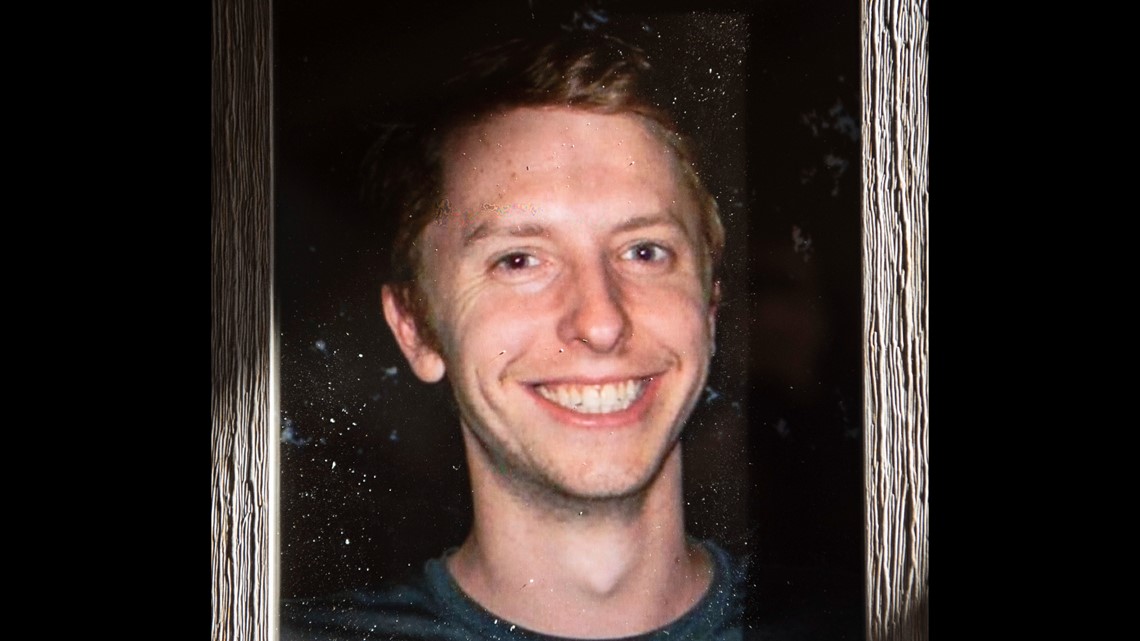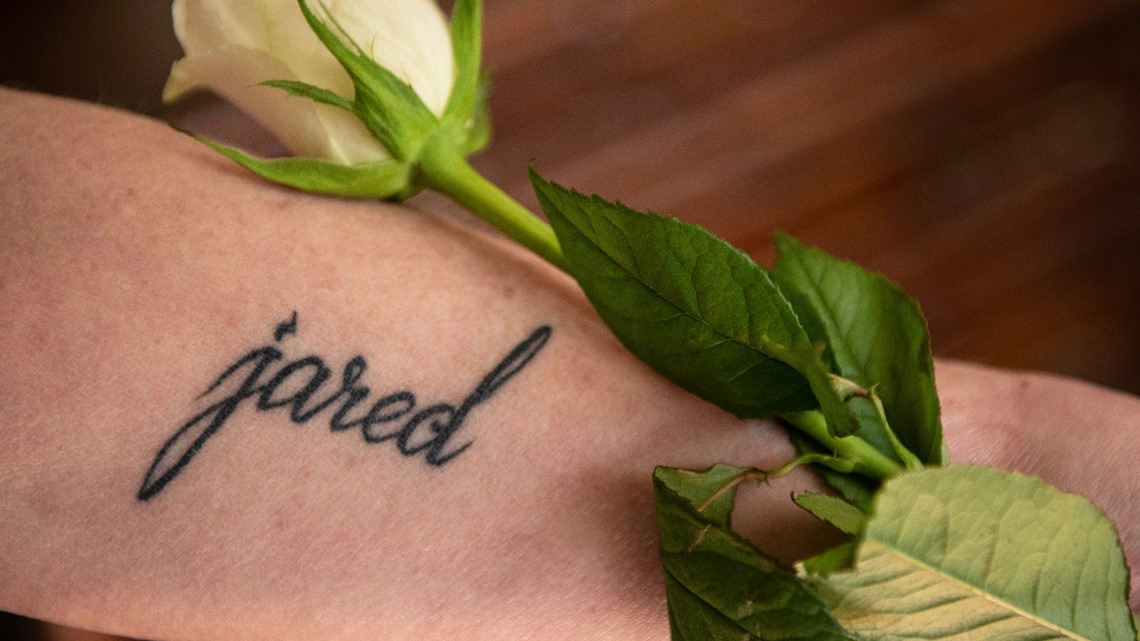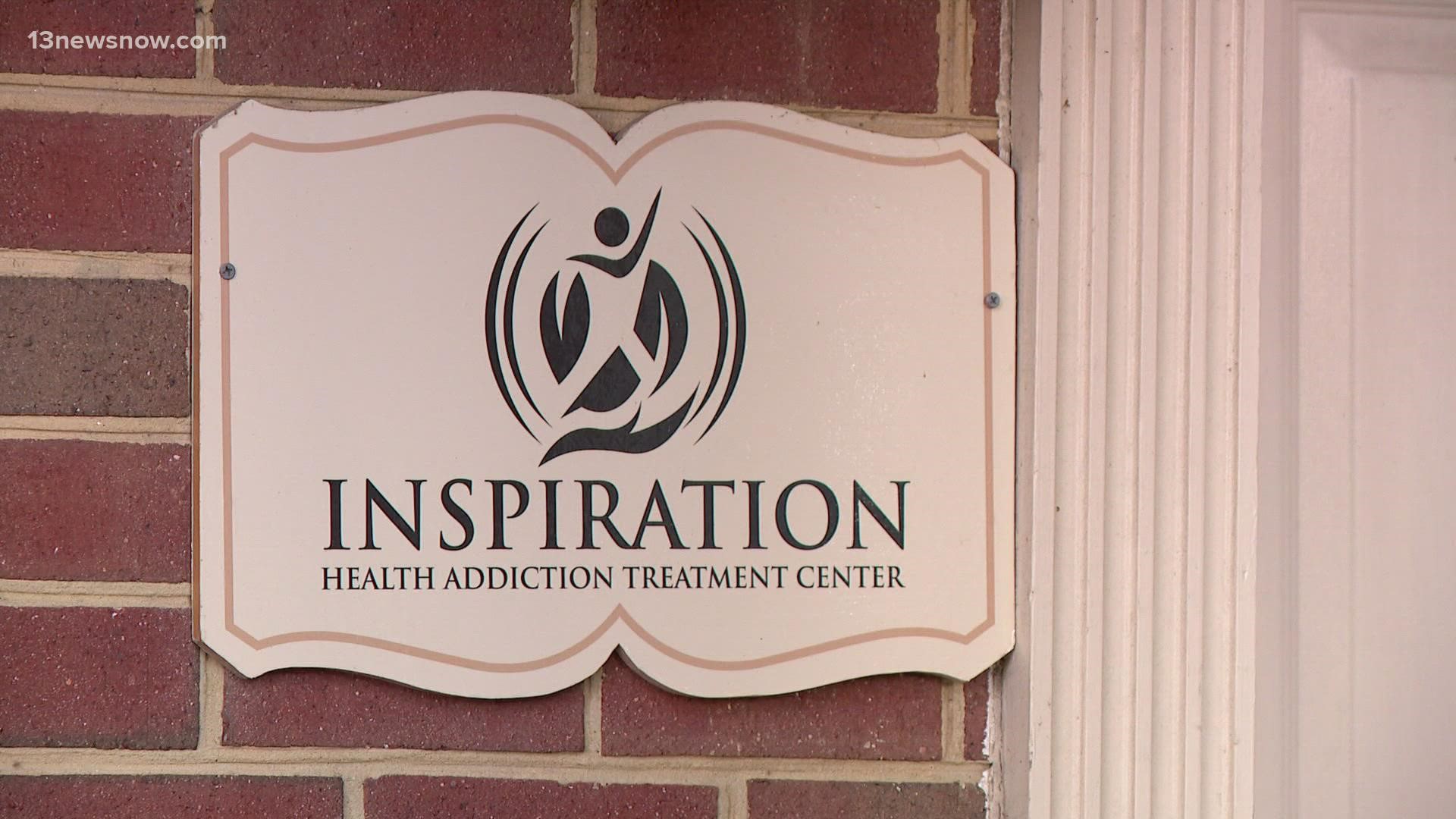WINSTON-SALEM, N.C. — Author's note: The video above is on file from a separate story that aired on November 17, 2021.
Photos — dozens of 4-by-6 prints, larger framed milestone portraits and snapshots showing the progression from child to young man — covered nearly every inch of Cheryl Wilson’s dining room table. A handful of stuffed animals and assorted mementoes had been interspersed between them.
“I’m sorry,” Cheryl Wilson said. “I didn’t know I was going to do this when I got up this morning.”
Neither apology nor explanation was needed. For some time, Wilson had been steeling herself to talk about her son Jared Weicht, who died from an overdose of fentanyl.
“I’ve been unable to come to terms with my son’s death … I would truly appreciate the opportunity to share my son’s story,” she’d written in an introductory email, “especially if it will help others who have loved ones struggling with this monster called addiction.”
That email led to an in-person meeting, a much more difficult proposition than the informality of electronic communication.
No one should outlive a child, and more than two years on, Wilson is looking for ways to help others similarly situated.
“We fought for 10 years,” she said. “My son was my heart … he is my heart. I just can’t give up.”


A LONG, HARD ROAD
Jared Weicht’s obituary is easy to find. An accompanying photograph shows him at his best, happy and dressed for a celebration.
“He had the most beautiful smile and such a kind heart,” Wilson said. “He loved the Panthers, fantasy football, fishing and his PlayStation.”
His age — just 31 — hinted at a tragic end.
Weicht died Feb. 17, 2020, just before the nation shuttered itself indoors and behind masks to battle COVID-19. Overdoses, the product of an opioid epidemic run wild, would reach stratospheric levels over the next year.
Nationwide, in just the first 12 months of shutdown, the Centers for Disease Control reported that more than 100,000 Americans died from drug overdoses. North Carolina, per the state Department of Health and Human Services, had more than 3,300 overdose deaths in 2020 — more than 70% of which involved fentanyl, a powerful synthetic opioid.
Even before her son’s death, Wilson was familiar with both the statistics and the cause.
“These are neurochemical conditions that people experience, not moral failings,” said Nathan Tate, a state licensed clinical-addiction specialist and licensed clinical social worker who counseled Weicht. “Fifteen to 20 percent of (substance abusers) are genetically predisposed to addiction disorder. For others, it can be trauma or any number of factors that give people heightened vulnerability to addiction.”
Predisposition appears to have played a big role with her son, Wilson said.
Weicht had been prescribed painkillers after getting his wisdom teeth removed when he was 20.
“In just five to seven days he was a completely different person,” Wilson said. “He spent the last 10 years of his life in recovery. Addiction is never past tense.”
Like many others, Weicht went in and out of inpatient rehab centers, individual counseling and group housing.
Each time, each step, Wilson hoped that sobriety would take permanently. But as any dealing with addiction knows, multiple attempts are the norm.
“Things would go OK, then not,” Wilson said. “After many, many mornings of not knowing what to expect when I went downstairs to check on my son, I couldn’t take the stress anymore as I constantly feared for his life in so many ways.
“Each and every day was a struggle.”
Perhaps the worst came after a relapse following a second serious attempt at rehab in South Carolina. Weicht had moved into a small apartment with another young man he’d met in treatment. Instead of person-to-person peer accountability, Weicht tried heroin — his roommate’s drug of choice, his mom said.
A spiral followed, and Weicht overdosed in 2014, winding up in an emergency room. “That was the first time I really felt like I could lose him,” Wilson said.
That progression from prescription painkillers to street drugs is common. Users’ brains have been rewired, Tate said, to seek drugs in much the same way as someone deprived of water even if that means crossing a line to inject heroin.
“You’ll do anything to get a drink,” he said. “If you don’t, you’ll be dead so you have to get water. … It’s survival calling the shots.”
The overdose was when Weicht hit rock bottom, leading him to try rehab again. “He realized he was fallible and that he could die,” Wilson said.
He started with a lengthy stay in an inpatient treatment center, a camp in Tennessee called the Ranch, and months in a halfway house in Charlotte that presaged a long period of good health and relative peace.
It also helped mother and son make lasting memories when they’d meet in Davidson for lunch and meaningful conversations.
“Jared’s life was back on track and he was motivated to move forward,” Wilson said.
Weicht found stability, oddly enough, by working nights in a warehouse. He threw himself into the job, earned promotions from janitorial duties to handling floor logistics and eventually training new hires.
And while that afforded him independence, pride in achievement and coworkers who became a second family, a few bad actors in the workplace may have played a role in his final relapse.
“(Jared) was a very nice young man who struggled with substance abuse, finally got it under control and got a steady job which is so difficult (with recovering addicts),” wrote Tom Comerford, a family friend and an attorney who advised Wilson after Jared’s death, in an email. “He got clean, got a place to live and then ran into a steady stream of drug suppliers and users at his job.”


HOLDING OUT HOPE
The day Weicht died was like any other in that he was headed out the door on Feb. 20, a Monday, about 4:30 p.m. He had his backpack on and was talking to a longtime friend on the phone.
“She knew that he’d been having a hard time,” Wilson said. “He told her that he’d taken something.”
He had relapsed, something his mom feared might happen because he was struggling with the demands of working nights.
Weicht stopped speaking and his friend, not knowing what else to do, contacted her own mother, who drove to Wilson’s house.
She tried her son’s cell but got no answer. She hoped that maybe he’d gone on to work or that his phone had died.
Wilson knew she couldn’t get to Huntersville in less than an hour, so she called the police there to see if they would send an officer to Weicht’s townhome.
But the Huntersville Police Department is small and closes at 5 p.m.
Next she dialed 911 but was informed that since she was calling from Winston-Salem, it was the wrong emergency system.
She hung up and called a Charlotte health-care provider, an ambulance service, anything she could think.
Eventually, she wound back up with the local 911 system and a dispatcher, Wilson said, was able to connect her with the Mecklenburg County emergency system.
By then, more than two hours had passed. When a patrol car arrived, an officer went in the back door after seeing Weicht on the floor.
“That’s the hardest to visualize, knowing that they took heroic measures to try and resuscitate him,” she said.
Wilson didn’t know any of that at the time, though, and waited at home for word.
She feared seeing a Winston-Salem police cruiser pull up, figuring that if bad news was coming, it would be delivered in person.
As time passed, she became hopeful.
Then her phone rang. An officer from Huntersville was on the line.
“He said, ‘I’m sorry we couldn’t save him,’” Wilson said. “I just remember hitting the floor. I don’t know how they could have saved him. Too much time had passed.”


CELEBRATING A LIFE
The next few days passed in a blur. Wilson and her husband had to tend to the details, planning a memorial and breaking the news to out-of-town family members.
Weicht’s sister Lindsey Gommel, for example, had to travel from Germany.
“Bury or cremate? Who has to think about that with someone as young as he was?” Wilson said.
Detectives from Huntersville came in person to tell Wilson what they had found — and explain their next steps.
They discovered a substance on the counter near where Weicht had fallen. They sent it to a lab to confirm what they suspected — that it was fentanyl.
After that, investigators indicated that they would try to pursue a death by distribution charge, a felony that carries the same penalty as first-degree kidnapping, passed by the state Legislature in 2019 that allows for the prosecution of drug dealers.
“It’s very difficult to prove,” said Detective Jeremy Smith of the Huntersville Police Department. “I can tell you that here in Mecklenburg County, since the legislation was passed in 2019, we’ve only had one case go forward and it has not been adjudicated.”
Before an investigation could get going, Weicht’s family needed to have a funeral at Home Moravian Church, burial in God’s Acre and to host a memorial where Wilson made it a point not to tiptoe around the truth.
Naturally, Weicht’s family and friends wanted to recall the happy times, the memories made at holiday gatherings and traveling to Europe and Alaska.
“Jared had the opportunity to see and experience so many places over the course of his life,” Wilson said. “I cherish beyond words the time that our family spent together.”
They told stories of a kind-hearted, sweet young man who would spend hours trying to help friends struggling the same way he was.
“He couldn’t say no to anybody,” Wilson said. “He would sit and talk to people for hours if that’s what they needed. He wanted to save everyone.”
And as anyone would, she thought about the last time she saw Jared in person, the day after Christmas in 2019.
“I remember looking at him as he drove off,” she said. “I hope he looked back. I hope he saw me standing there. You never know when it’s the last time.”
Wilson also replayed the last conversation she had with her son, on the phone, the night before he died. Mother knew her son was struggling and they talked about options.
“Jared would die the next day of a fentanyl overdose,” Wilson said. “I will never grow accustomed to speaking those words, and they always leave an ache in my heart.”


PURSUIT OF JUSTICE
Investigators were able to find a likely supplier of the fentanyl, a man who was charged with federal crimes including trafficking and weapons charges. He pleaded guilty in the U.S. District Court for Western North Carolina in 2021 and is awaiting sentencing.
Local detectives continued to try unsuccessfully to have the supplier charged with a state charge for death by distribution.
Speaking in general terms and not specifically to the circumstances surrounding Weicht’s death, Smith said that finding witnesses to drug sales and finding electronic communications — texts, instant messages and/or email — can be determining factors in decisions about charging dealers.
“The biggest thing is we have to prove that the substance that caused a death was sold by a specific suspect,” he said.
Wilson gets that. Only a handful of such prosecutions have been successful in North Carolina, at least one in Forsyth County since 2019.
“It’s such a hard statute, so difficult to prove,” Wilson said. “I understand the state carries the burden of proof.”
A death by distribution charge highly unlikely, Wilson began to think about other options.
She briefly considered some sort of civil suit against the dealer for wrongful death, but realized with Comerford’s guidance that a trial would be painful and that the statute of limitations was a consideration.
“Besides, a suit doesn’t help others and it won’t bring Jared back,” Wilson said.
Still, Wilson pressed to learn as much as she could. Her husband was able to find a private investigator able to open Weicht’s phone in December 2021 — something that police had been unable to do.
“My Christmas present,” Wilson said.
Transcriptions of Weicht’s messages, which Wilson said she couldn’t bring herself to read, showed that he had asked for heroin but received pure fentanyl instead. Messages also confirmed who had supplied it, Wilson said.
That information was jarring, and helped lead Wilson to another possible avenue for healing: speaking about her son’s life and death.
“I’ve heard countless times that Jared always tried to help others, so I hope his story will touch the lives and hearts of others,” Wilson said. “I know, to do so, would mean something to him.”
And likewise, to a mother.
“It’s a real common space for grieving parents,” Tate said. “A lot of them would like to destigmatize the condition and help get it out of the closet and into the light. It’s an unfortunate thing that the best ambassadors are those who are grieving.
“But no one has that same authenticity.”
Going forward, Wilson hopes to one day help people deal with the stigma that can come with the first step — admitting a problem.
“Addiction is a disease. I don’t understand how people see it any other way,” she said.
She would also like for desperate, supportive families to learn some practical measures even if they’re difficult to accept.
If she could do one thing over, Wilson said, she would see that her son had test strips that detect fentanyl and a supply of Narcan, an overdose reversal drug that’s saved tens of thousands of lives.
As for her own recovery, Wilson says she’s “not sure yet what that looks like.” She’s considering volunteering at harm-reduction centers and speaking to support groups.
But that’s down the road. For now, she has memories — and rituals.
Each night, she touches a painting of Jared before going to bed.
“Grief is just love looking for a place to go,” she said.

